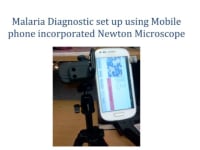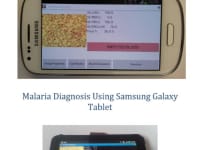
With the advancements in mobile technology and broadband communications, smart phones plays a momentous role in facilitating access to some diagnostic services to people living in the most remote areas. Due to the scarcity of clinical workstations in malaria endemic countries such as India and Sub-Saharan Africa, there has been a wide interest in the field of diagnostic pathology to incorporate modern telecommunication technologies in telemedicine.
This abstract describes a complete diagnostic tool using a mobile phone which performs image acquisition, processing and analysis of microscopic images of peripheral thin blood smears and enables fast, cost effective diagnosis of Malaria (caused by genus plasmodium) without human intervention. A set of image processing algorithms for blood image analysis, which estimates and differentiates the Red blood cells and White blood cells and further detects the malaria- infected cells, has been implemented using Android based mobile application tool onto the mobile phone platform with minimal memory footprint, loss of information integrity and acceptable processing speed and duration. The mobile phone acts as a complete diagnostic tool with an added advantage of plasmodium-species life-stage recognition and storing the results and images in remote locations such as PC and/or clinical server for future referencing.
The image processing algorithm for malaria diagnosis uses (a) the ARR transform algorithm to segment the blood components, (b) WBC differentiation algorithm using size of the cells and mean intensity values to distinguish WBCs and RBCs and (c) Hue-ARR algorithm for infected cells identification and malaria life-stage recognition. This has already been designed and tested in Matlab environment. In order to implement these algorithms into the mobile phone, the Android platform was selected due to its flexibility to customize, its use of open-source Linux kernel and the availability of a virtual simulator for mobile software design. In addition, Android-based smart phones are popular in malaria-endemic countries and are comparatively cheaper than the others which make the application affordable compared to existing laboratory diagnostic procedures.
The application used specialist development software for Android and the Java development tool. Eclipse is an Integrated Development Environment (IDE) which contains the tools and frameworks for designing, installing and managing the software. Android applications are developed in a Java language environment and can be open sourced using Java programming. Hence along with Eclipse, the essential tools such as the Java Development Kit (JDK) which is a bundle of software for Java development and Java Runtime Environment (JRE) to run the application in a virtual environment are also used. In addition, an Android Software Development Kit (SDK) with relevant Application Program Interfaces (API) has to be added to the Eclipse IDE with Android Development Tools (ADT) to streamline the development.
Like the Matlab software, the Android application was also developed using floating-point arithmetic. The application was tested on an Android emulator and has been successfully run on a Samsung Galaxy Mini, Samsung S2, Samsung S3, Samsung Galaxy Note and Samsung Galaxy Tablet. An Android mobile device with a minimum requirement of Android Version 2.2 is essential.
-
Awards
-
 2014 Top 100 Entries
2014 Top 100 Entries
Like this entry?
-
About the Entrant
- Name:Saumya Kareem Reni
- Type of entry:teamTeam members:Dr.Saumya Kareem
Prof Izzet Kale
Prof Richard Morling
Corentin Dallet - Software used for this entry:Android, Java
- Patent status:none





